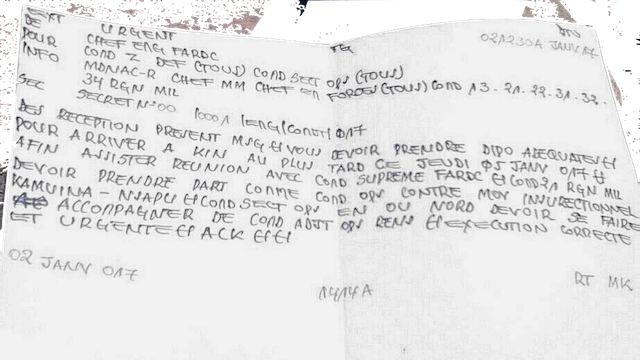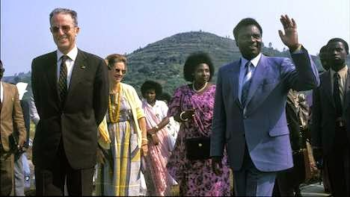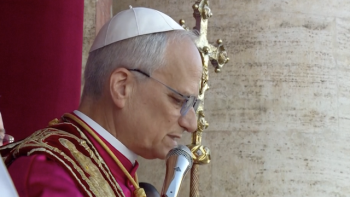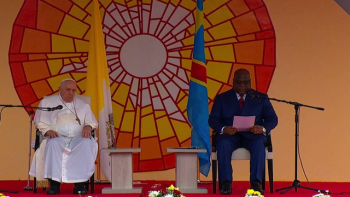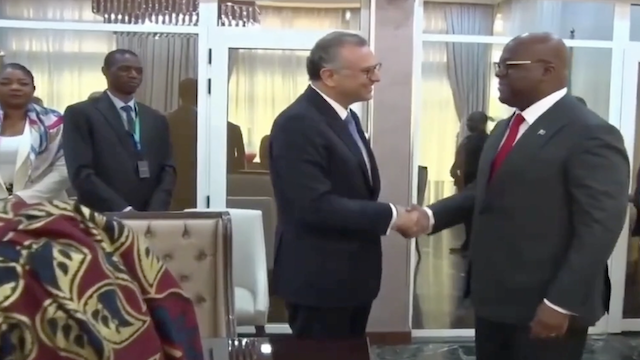In the last hours of 2016, on December 31, 2016, a deal between Joseph Kabila and his opposition was announced. The deal was reached following the Plan B of a political dialogue brokered by the National Episcopal Conference of the Democratic Republic of Congo (DRC), known as CENCO between President Joseph Kabila's political alliance, the presidential majority (MP) and the Rassemblement, a broad coalition of opposition groups. A telegram, a copy of which AfroAmerica Network has received (see photo), sent by FARDC Overall Commander (CHEF EMG FARDC) to all the region and sector military commanders of the DRC, their deputies, those in charge of military intelligence, and those commanding operations against an insurgency known as Kamuina-Nsapu in Kasai, on Jan 2, 2017 has casted doubts on the deal.
A Brief Sigh of Relief!
When the deal was reach, most applauded: finally, the Catholic Bishops of the CENCO had resuscitated what many thought was a dead process. The Congolese people were finally going to breath a long sigh of relief: Joseph Kabila would step down, giving up ambitions for an illegal third term and new leaders would be elected through a democratic process. It was good... too good to be true, in fact.
Unfortunately, just a few hours after the deal was announced, cracks started to appear. Some political leaders refused to sign. These included members of the opposition party MLC but also the new prime minister, Samy Badibanga. Then, Joseph Kabila's Presidential Majority (MP), including those that have signed, started questionning the deal itself, arguing that it was "not inclusive". Then, all found out that the main leaders, that is Joseph Kabila, on behalf of Kabila's MP and Etienne Tshisekedi for the Rassemblement, had not signed and may never do it, after all. Joseph Kabila's MP requested a Third Dialogue, led by CENCO, to address the "inclusivity" requirement. It is only then, they said, that Joseph Kabila will be ready to sign.
Politicians' Rhetorics
While this was going on, other opposition leaders praised the deal, but mostly insisted that its applicability was the real issue.
- The exiled leader of Eastern DRC, Antipas Mbusa Nyamwisi, praised CENCO's effort, the deal, and the international community, but said he will not return to DRC. Why? He did not elaborate.
- The exiled leader of the mineral-rich Southern DRC, Moise Katumbi, praised the deal, thanked the CENCO, the international community, and Joseph Kabila, while declaring his intentions to run for presidency; but, he fell short of specifying when he intends to return to DRC.
- Vital Kamerhe, once a leading contender before joining Joseph Kabila's initiative that led to the Oct 18th failed deal, and now despised by many from both parties, praised the deal and thanked the Congolese people and everybody, but remained cautious on the applicability.
- Samy Badibanga, the powerless Prime Minister, refused to sign the deal. He, instead, dismissed Vital Kamerhe and others who were part of Oct 18, 2016 deal but ended up signing the Plan B.
- Etienne Tshisekedi said nothing. His son and representative, Felix Tshisekedi, praised the deal that, he said "appears credible and brings hope". He then invited the Congolese people to remain vigilent.
- The self-styled Communication Minister Lambert Mende, known in Kinshasa as "Joseph Kabila's parrot", , signed, praised, questioned, and rejected the deal at the same time.
What is behind.
From the sources, all these statements do not match what is happening in the background. This is what may really be going on based on several sources contacted by AfroAmerica Network:
Joseph Kabila's Telegram Summon
Joseph Kabila has never believed and does not believe in the deal. In fact, he is getting ready for a chaos. This is confirmed by the telegram sent by FARDC Overall Commander (CHEF EMG FARDC) to all the regional and sector military commanders of the DRC, their deputies, those in charge of military intelligence, and those commanding operations against an insurgency known as Kamuina-Nsapu in Kasai, on Jan 2, 2017.
The telegram, no 021230A market SECRET No 00 10001\ENG\CONOT\017 and that AfroAmerica Network has received a copy (see picture), reads as follows (Translation from French, including acronyms):
"Immediately upon receiving this message, you are required to take all necessary actions to depart for and arrive in Kinshasa on Thursday Jan 5, 2017 to attend a meeting with Supreme Commander FARDC. Deputy Commander of military Region, must also attend, as well as the Commander of ops against insurrectional movement KAMUINA-NSAPU. COMD SECT OPS EN or NORD must be accompanied by Deputy Commander OPS and Intelligence. CORRECT AND URGENT EXECUTION. "
The commanders and troops contacted by AfroAmerica Network have expressed the fear that, based on the telegram, Joseph Kabila may be preparing a war, in case his attempt to remain in power is challenged. Other sources have informed AfroAmerica Network that, in preparation for potential civil unrests, Joseph Kabila just ordered around 2,000 K-9 (police dogs) from a major country in Europe. These dogs will be distributed to the police in major cities around DRC, especially in Kinshasa, Lubumbashi, Bukavu, Goma, Kisangani, and Matadi.
These dogs reinforce the 350 Rwandan special forces already in Kinshasa, embedded within Joseph Kabila's Republican Guard.According to sources, even close to Joseph Kabila and General Kabarebe of Rwanda, the planned unrests will follow Joseph Kabila's decision to reject the deal and instead go for a referendum.
One recall that Kamuina Nsapu was the traditional king of the people of Kasai. He was killed on August 2016. His followers accused Joseph Kabila's troops of assassinating the king Kamuina Nsapu and have since launched a bloody rebellion.
Opposition leaders
Opposition leaders do not want the deal. Some say thay cannot reject the deal reached by CENCO, a major power broker backed by a power institution that Catholic Church is. They praise CENCO, for a difficult task but reject the deal, as unworkable. Some leaders and people is areas have started to even question the independence of CENCO from Joseph Kabila. Some have expressed a view that CENCO has been outsmarted by Joseph Kabila, who, they add, may have brought the bishops to bless a deal that would allow him to remain in power while carefully planning his next move.
Samy Badibanga has vowed to remain in power that he never had the chance to exercise, whereas Etienne Tshisekedi may not have the chance to ascend to power he has always sought.
CENCO.
It appears that the leaders of the Catholic Church are themselves deivided about the deal.





